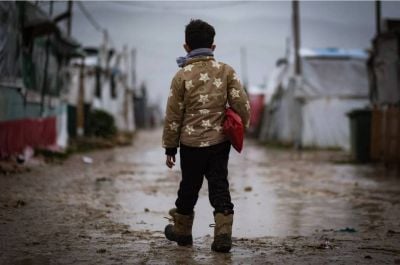
Lebanese students demonstrating in Beirut on Nov. 8, 2019. (Credit: Anwar Amro/AFP)
BEIRUT — Staggering levels of unemployment and a state of “acute vulnerability” characterize Lebanon’s youth, a report released Thursday by the Lebanese Center for Policy Studies shows. A survey of 500 respondents between the ages of 21 and 29 in the Beirut I and Beirut districts was carried out in the month before the May 2022 parliamentary elections, shedding light on their main concerns.
The survey laid bare two main patterns: firstly, youth in the country are in a state of “acute vulnerability.” Over the last six months, a majority of those surveyed found themselves forced to reduce their food consumption (55.4 percent), with an even larger percentage having to diminish their use of basic necessities, like lighting, heat, and water (64.2 percent), as well as refraining from (or postponing) the purchase of necessary clothing (65 percent).
A shocking 58.2 percent of respondents said that they had not held a job in the past 12 months. This data illustrates the high levels of youth unemployment in the country due to the still spiraling economic crisis. According to World Bank estimates, youth unemployment nearly doubled from around 23 percent, prior to the crisis, to an alarming 40 percent in 2020. The top three economic issues respondents wanted to see the government prioritize were: rising unemployment (23.5percent), currency depreciation (22 percent), and basic services (15.4 percent).
While youth in Beirut I and II polled similarly in their responses throughout the survey, the report detected a distinction in their ranking of the major problems facing Lebanon. While the top three issues identified in Beirut I were the economic collapse, sovereignty challenges, and lack of accountability, in Beirut II, the order saw a slight difference, with “poor services” replacing “sovereignty challenges” in the ranking. This could be a reflection of both “the longstanding debate in Lebanon over the sequencing of where to place Lebanon’s sovereignty — and those responsible for undermining it — in assessments of Lebanon’s economic crisis and pathways out of it” on the one hand and the growing inequality within Beirut (and the country) on the other, the report found.
The second notable pattern the report discerned was the “alarming” low levels of confidence in Lebanon’s political and economic system, including the new government. While the majority of respondents indicated having no trust in a new government (55 percent), only a slim minority (3.4 percent) had full trust in a new government to resolve the crisis. When asked about their outlook on the future, the vast majority expressed some level of pessimism, and only 1.4 percent expressed outright optimism. In a further illustration of this point, only around 15-16 percent of respondents did not express a desire to emigrate permanently from the country. With regards to the recent parliamentary elections, 52.6 percent of respondents expressed that they did not feel safe to vote freely in the electoral process while 41 percent indicated the opposite.
Further emphasizing the respondents’ lack of hope for a future in their country, the report states: “Youth in Lebanon are not simply leaving or aspiring to migrate out of the country, they are being forced to. And as the channels of formal migration narrow, particularly to those most vulnerable, irregular modes of migration will become critical routes out of Lebanon.”
